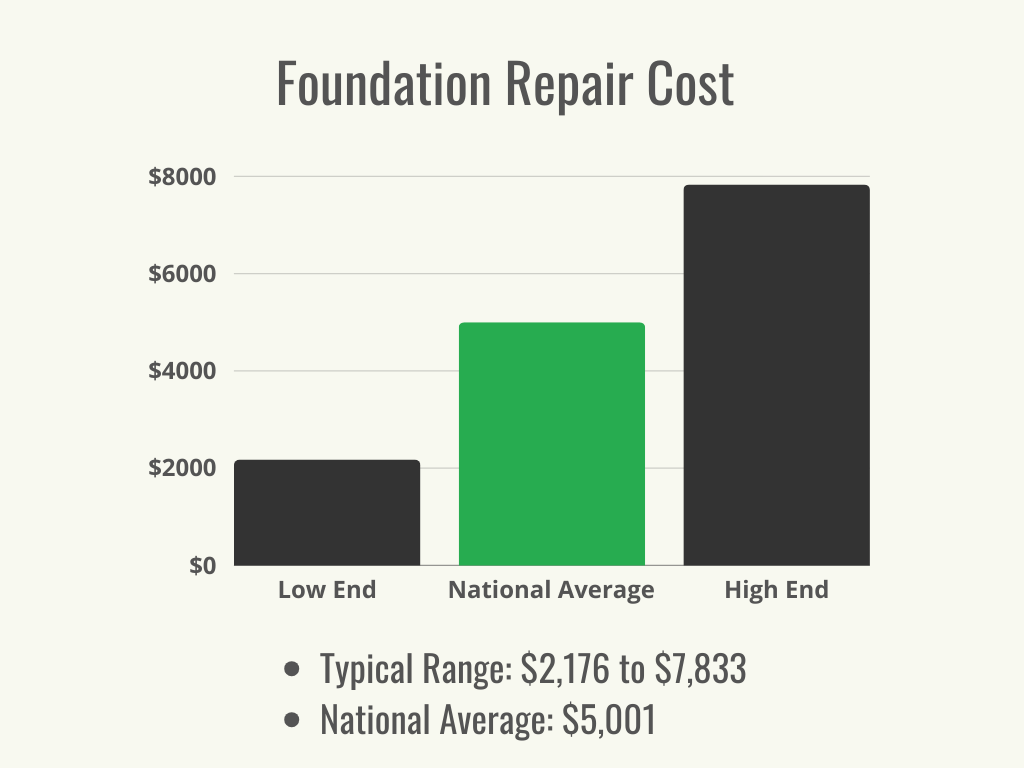We may earn revenue from the products available on this page and participate in affiliate programs. Learn More ›
Highlights
- Foundation repair typically costs between $2,176 and $7,833, with the national average foundation repair cost at $5,001.
- Some of the main factors that affect foundation repair cost include the type and severity of the damage, the repair method, and the type of material of the foundation.
- There are several signs that a foundation needs repair services, including persistent water and dampness, large horizontal cracks, crumbling concrete, and sloping or sagging floors and walls.
- Foundation damage can be dangerous, and homeowners will want to consult a professional as soon as they notice any issues to diagnose and repair any structural issues.
Foundation settling that results in cracking can lead to significant structural issues. For homeowners who notice cracks in their home’s foundation, foundation repair costs are a natural concern. According to Angi, homeowners can expect to pay between $2,176 and $7,833 for foundation repair, with the national average at $5,001.
Some larger problems that can help homeowners identify foundation issues are cracked walls, settled floors, doors that are difficult to open and close, and even collapsed ceilings and burst pipes. Repairing any cracks right away will help homeowners avoid potentially irreversible damage. Homeowners can search for “foundation repair near me” to get an idea of rates in their area.

Stop Foundation Damage Before It Gets Worse
Groundworks expert team can fix foundation issues before they become costly. Schedule Free Inspection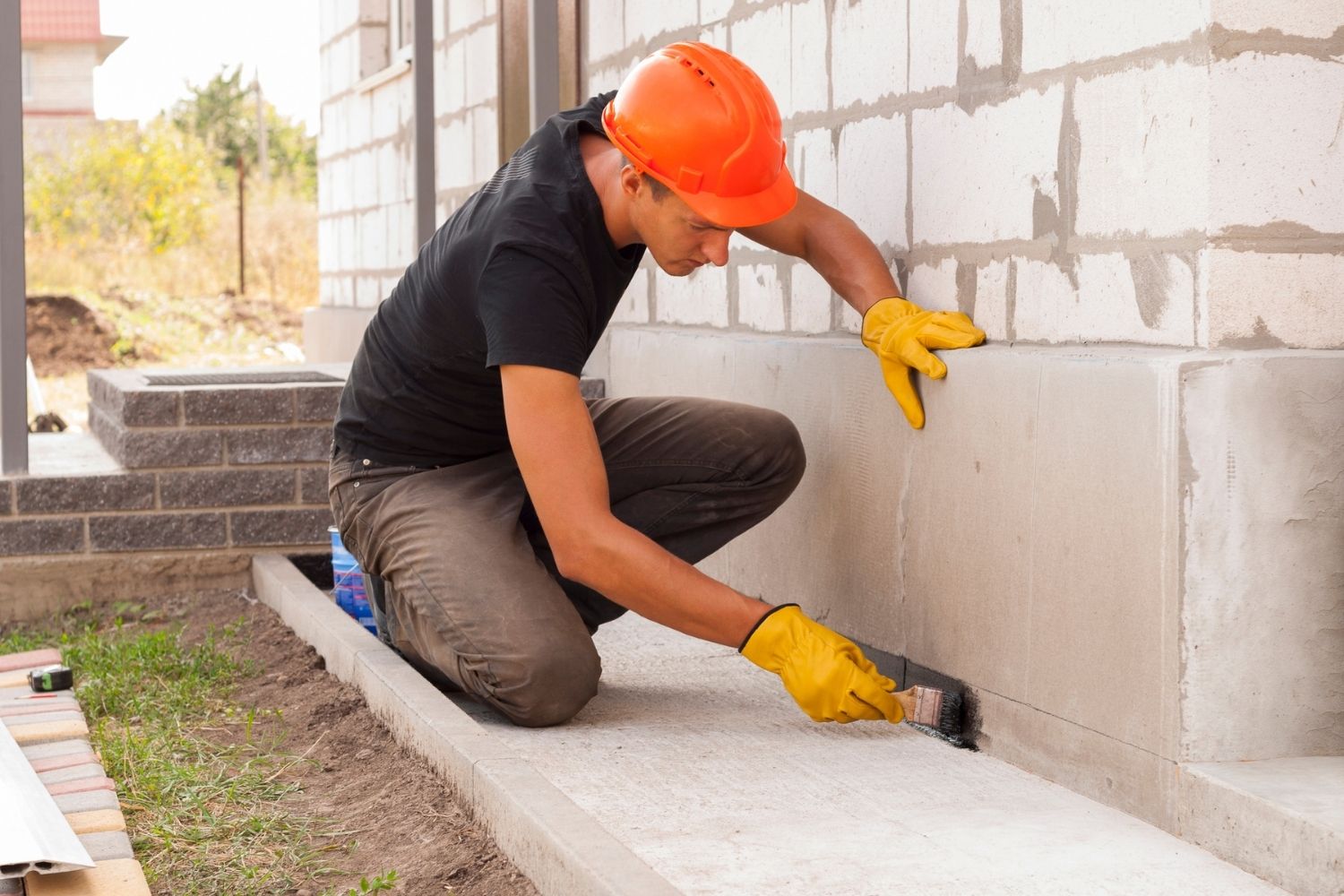
Key Cost Factors
How much does foundation repair cost? That depends on many factors. Prices can differ from the national average due to labor, permits, materials, the cause of the damage, the type and severity of the issue, the repair method, the type of foundation, accessibility of the damage for repairs, home size, soil stability, and foundation settlement.
Issue Cause
The extent of necessary foundation repairs will vary greatly depending on the cause of the damage. For example, if the foundation has minor cracks but is otherwise structurally sound, the repairs will likely cost somewhere between $250 and $800. Small leaks may not seem like a big deal, but they often indicate a deeper drainage issue. For more severe or frequent leaks, basement waterproofing costs from $2,300 to $7,575.
For a foundation that is settling and sinking, soil drainage is a common culprit that will also need to be addressed to prevent the issue from recurring. Overall, a drainage system will cost between $2,800 and $6,500 to install. Bowing basement walls are another clue that poor soil drainage is affecting a foundation. In addition to the cost of addressing any soil issues, bowing basement wall repair costs $5,000 to $15,000. Sinking foundation repair costs $4,500 to $20,000. It’s common for the foundations of older homes to crumble and erode, especially if there is also water damage. Repairs to the home’s gutters may also be necessary to prevent further water damage.
| Issue Type | Average Cost (Materials and Labor) |
| Bowed walls | $5,000 to $15,000 |
| Crack | $250 to $800 per crack |
| Leak | $2,000 to $7,000 |
| Settling or sinking | $4,500 to $20,000 |
Issue Severity
If foundation issues are caught early, it’s likely that only minor repairs will be needed and costs will stay relatively low. But because foundation damage can affect the structural integrity of the entire house, the problem will become more extensive and more costly the longer the homeowner waits to address it. Not only will the foundation itself need significant structural repairs, but the cost of plumbing, wall, or floor repair will also add up. The full extent of damage to a foundation isn’t always clear at first glance, but a professional can help assess the situation in its entirety and offer informed recommendations to the homeowner.
Repair Method
The average cost of foundation repair is $5,001. This price can fluctuate depending on the type of repair method used to remedy the foundation damage. The most common types of home foundation repair methods are basement underpinning or piering, jacking, stabilization, sealing, reinforcement, leveling, and waterproofing. In most cases, the type of damage the foundation has will dictate which repair method is used.
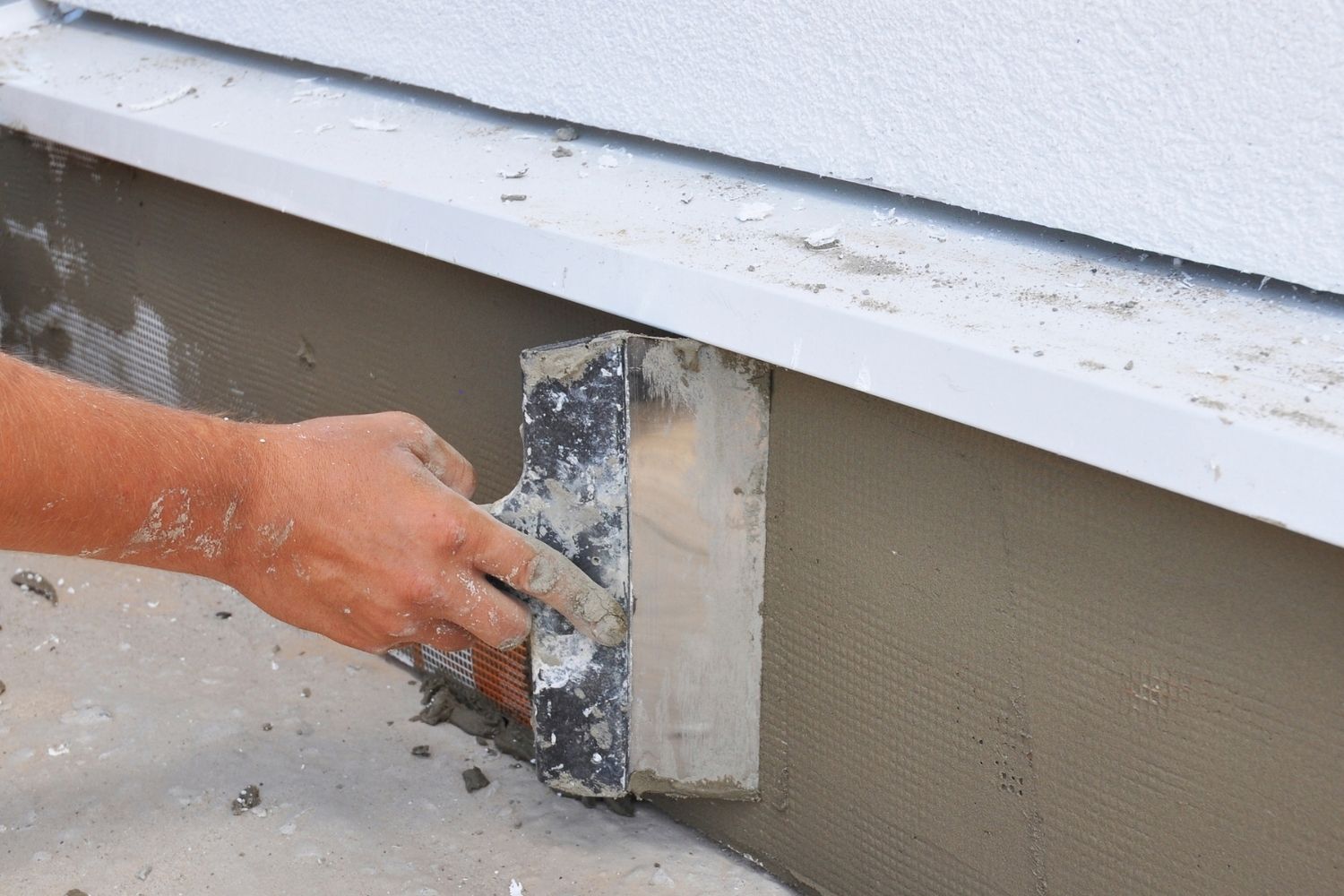
Foundation Type
A home’s foundation type will play a large part in determining the cost and type of repairs needed. Homes that have basements require more substantial excavation than homes with concrete slabs. Homes with pier and beam structures or crawl spaces are typically easier to repair and access. These are some of the most common foundation types.
- Concrete slab. If the home has a concrete slab that is settling, it can usually be repaired with sealing and mudjacking. The cost of concrete slab repair is between $350 and $20,000. A new concrete slab costs between $3,600 and $7,200.
- Crawl space. Crawl spaces can experience moisture issues that create serious deterioration under a home. The crawl spaces can crack, bow, and settle, causing the house to sink when the supports shift. One way to solve this problem is to install adjustable joists to level the foundation.
- Brick and cinder block. Brick and cinder block foundations are prone to cracking, leaking, and eventually bowing. Cracks will need to be filled, and any drainage or moisture issues will need to be repaired, which costs $350 and $25,000. Stabilizing the foundation can be done with steel or carbon fiber reinforcements.
- Basement. It’s common for basements to settle, sink, crack, bow, and leak, which can lead to more serious issues if repairs aren’t made right away. If the basement walls are cracked severely or are bowing, they will need to be reinforced. It’s typical for basements to need waterproofing, which involves extensive excavation and costs between $2,300 to $7,600 on average.
- Pier and beam. The most common issues with this type of foundation are settling and wood decay caused by shifting soil and moisture. Wooden beams are usually replaced with steel, and sometimes extra piers are added for additional support. A sump pump may be installed to combat moisture and decay problems. Pier and beam foundation repair costs around $700 to $25,000.
- Stem wall. A stem wall, or basement foundation, is most commonly affected by water damage, which lead to fluctuations in temperature that cause cracks. Smaller sections of damage can be patched and sealed, but for bigger cracks, mudjacking is the most effective approach. The cost to repair a stem wall runs between $350 and $20,000 depending on the severity of the problem.
| Foundation Type | Repair Cost (Materials and Labor) |
| Concrete slab | $350 to $20,000 |
| Crawl space | Varies |
| Brick and cinder block | $350 to $25,000 |
| Basement | $2,300 to $7,600 |
| Pier and beam | $700 to $25,000 |
| Stem wall | $350 to $20,000 |
Foundation Material
The material that a foundation is made of will affect the method of repair as well as the cost. Wood foundations are typically the least costly to repair at $400 to $10,000. This usually involves replacing beams that have been affected by mold and water damage with new ones and sealing them. Cinder block can be one of the costliest materials to repair, depending on the number and size of the cracks in the material; this cost is usually between $600 and $25,000. For some materials like concrete, foundation repair professionals may need to raise the house to work on or replace the foundation, increasing the overall cost significantly.
| Foundation Material | Repair Cost (Materials and Labor) |
| Brick | $350 to $15,000 |
| Carbon fiber | $600 to $14,000 |
| Cinder block | $600 to $25,000 |
| Concrete | $350 to $20,000 |
| Foam | $350 to $25,000 |
| Steel pier | $950 to $19,200 |
| Stone | $400 to $20,000 |
| Wood | $400 to $10,000 |
Home Size
The size of the home will also affect foundation repair costs. Larger homes are typically more expensive to repair since they weigh more, are more structurally complex, and need more equipment and materials. If hydraulic piers need to be installed, the larger the house, the more piers will be required to support the foundation. Each pier may cost anywhere from $700 to $2,100 depending on the type.
Labor, Permits, and Materials
The average hourly price for labor is around $200. Most foundation repair services will charge for labor by the hour, but homeowners can check with their contractors to be sure. Permits are required for foundation repair, with an average cost of $75 to $150. The materials used for foundation repairs depend on the cause of the problem. Some common materials are jacks, epoxy, polyurethane foam, waterproofing items, grout, cement, sealant, hydraulic piers, carbon fiber, steel reinforcement strips, and steel support beams. A professional will know exactly what type of material will fix any foundation problem.
Accessibility
Calculating the cost of foundation repair depends on the type of foundation, damage, and repairs. The overall foundation repair cost will depend on the particular issue and repair method used. Some factors that impact cost include how accessible the foundation is and whether landscaping will need to be removed. Typically, crawl space foundation repair costs less because the area is easily accessible.
Soil Stability and Foundation Settlement
Soil contraction, expansion, and settlement in addition to inadequate foundation drainage commonly cause foundation problems. The only way to prevent foundation settlement is to install a deep and stable foundation with steel push piers or helical piers. This method transfers the weight of the home from unstable soil to robust supports. Some grounds have a greater shrink-swell potential than others, so it’s important to have a foundation professional’s assessment. Soil stability also affects drainage. Insufficient drainage can cause erosion underneath a home, negatively impacting the foundation’s structure and causing it to sink and settle. Every situation and foundation is different, so homeowners will want to ask their foundation repair professional what type of repair is best for the type of soil underneath their home.
Additional Costs and Considerations
When homeowners are budgeting for foundation repair costs, there are usually additional price factors and considerations. One is the cost of a foundation inspection, which may be required prior to the repair. A structural engineer report, a soil report, and unseen obstacles are also possible costs to factor into the budget.
Structural Report
A structural engineer acts as a neutral third party who will inspect all unconcealed areas of the foundation, crawl space, and basement for signs of water damage, deterioration, distress, cracking, or other problems. A structural engineer report can cost between $300 and $1,000.
Soil Report
All homes settle and can shift over the years. Soil contraction and expansion are the leading causes of a house settling. Some homeowners water their foundation if it gets too dry to prevent the soil from constricting the foundation, but there is little evidence to support this practice. Soil reports are typically completed before a house is built, but the homeowner may not have one readily available if their home is older. A geotechnical engineer can determine what type of soil is surrounding the home and what kinds of foundation problems it can cause. A soil report can run between $500 and $3,000.
Unseen Obstacles
In addition to the type of foundation problem and the repair method used, another variable that can affect foundation repair cost is hidden obstacles in the ground. Some common unseen obstacles include extra-deep footings, old repair methods, or tree roots. Removing these hidden obstacles can add an average of $1,000 to $2,500 to the overall project cost.
Foundation Lifting
For foundations with severe damage, it may be necessary to lift the house in order to make the repairs. Lifting the structure is a massive undertaking and is reflected in the cost, which can range from $20,000 to $23,000.
Foundation Replacement
A house will also need to be lifted if the entire foundation needs to be replaced. The cost for foundation replacement is significantly higher; homeowners can expect to pay between $20,000 and $100,000.
Foundation Insulation
Insulating a foundation can increase the home’s energy efficiency and protect against issues like moisture and mold. If the foundation is not already insulated, it may be worthwhile to have it installed while repairs are underway. Whether this is possible will depend on the foundation materials and the type of repairs being made. The cost to insulate a foundation is typically between $1.50 and $3.50 per square foot.
Landscaping and Drainage
If there are trees or shrubs blocking access to parts of the foundation, landscaping services may be needed to clear the area before repairs can be made. Landscapers may also need to return after the foundation has been repaired to clean up any debris or restore the landscaping that borders the house. If the foundation damage is caused by a tree root that has grown under the foundation, the tree will need to be removed before repairs can take place. For landscaping or tree removal, homeowners will want to budget an extra $200 to $500. If water or erosion has caused damage to the foundation, a French drain may need to be installed to prevent further damage. Drainage system installation can cost between $2,800 and $6,500.

Types of Foundation Repairs
Depending on the type of issue, foundation repairs can cost as little as $250 for minor cracks and upwards of $23,000 or more if the issue requires hydraulic piers. The average homeowner will typically pay between $2,176 and $7,833 for foundation repair costs.
| Foundation Repair | Average Cost (Materials and Labor) |
| Crack repair | $250 to $800 per crack |
| Foundation lifting | $20,000 to $23,000 |
| Leak repair | $2,000 to $7,000 |
| Mudjacking or slabjacking | $500 to $1,300 |
| Piering or underpinning | $1,000 to $3,000 per pier |
| Stabilization or reinforcement | $4,000 to $12,000 |
Crack Repair
Foundation crack repair costs between $250 and $800 per crack. Some foundation cracks are minor and easy to fix. Cracks wider than ⅛ inch are a cause for concern, and hairline cracks should be repaired to prevent additional water damage. For larger cracks, homeowners will want to consult with a structural engineer about available options when it comes to repairing a foundation crack.
The total cost is usually determined by the direction the cracks are running: horizontally or vertically. Vertical cracks are generally harmless, but can be filled with an epoxy- or polyurethane-based filler and sealed if needed. Horizontal cracks are a sign of a significant problem. These cracks may require the walls to be reinforced, which can cost upward of $4,000.
Foundation Lifting
In some cases, part or all of the foundation may need to be lifted to return it to its original height and placement in the ground. Costs for foundation lifting can range from $20,000 to $23,000, depending on how much the foundation needs to be lifted as well as the foundation type. It may also be necessary to make changes to the soil composition or implement drainage systems to prevent the foundation from sinking in the future.
Leak Repair
Foundation leak repair can run from $2,000 to $7,000. Costs may vary depending on the type of foundation—for example, slab leak repair costs $630 to $4,400. Foundation leaks signal issues with drainage and moisture around the home. It’s common to need waterproof sealing around the foundation if it’s leaking. To do this, the contractor will excavate around the foundation, establish new tile drains, and fill any cracks with cement. The structure will then be coated in sealant and wrapped with waterproof material. Water pressure is another issue that can erode the walls and foundation, causing them to crack and allow water into the house. If flooding or water damage is expected in the spring or summer, a professional may recommend installing a sump pump to ensure all water is pumped up and out of the home. The installation of a sump pump averages between $641 and $2,044.
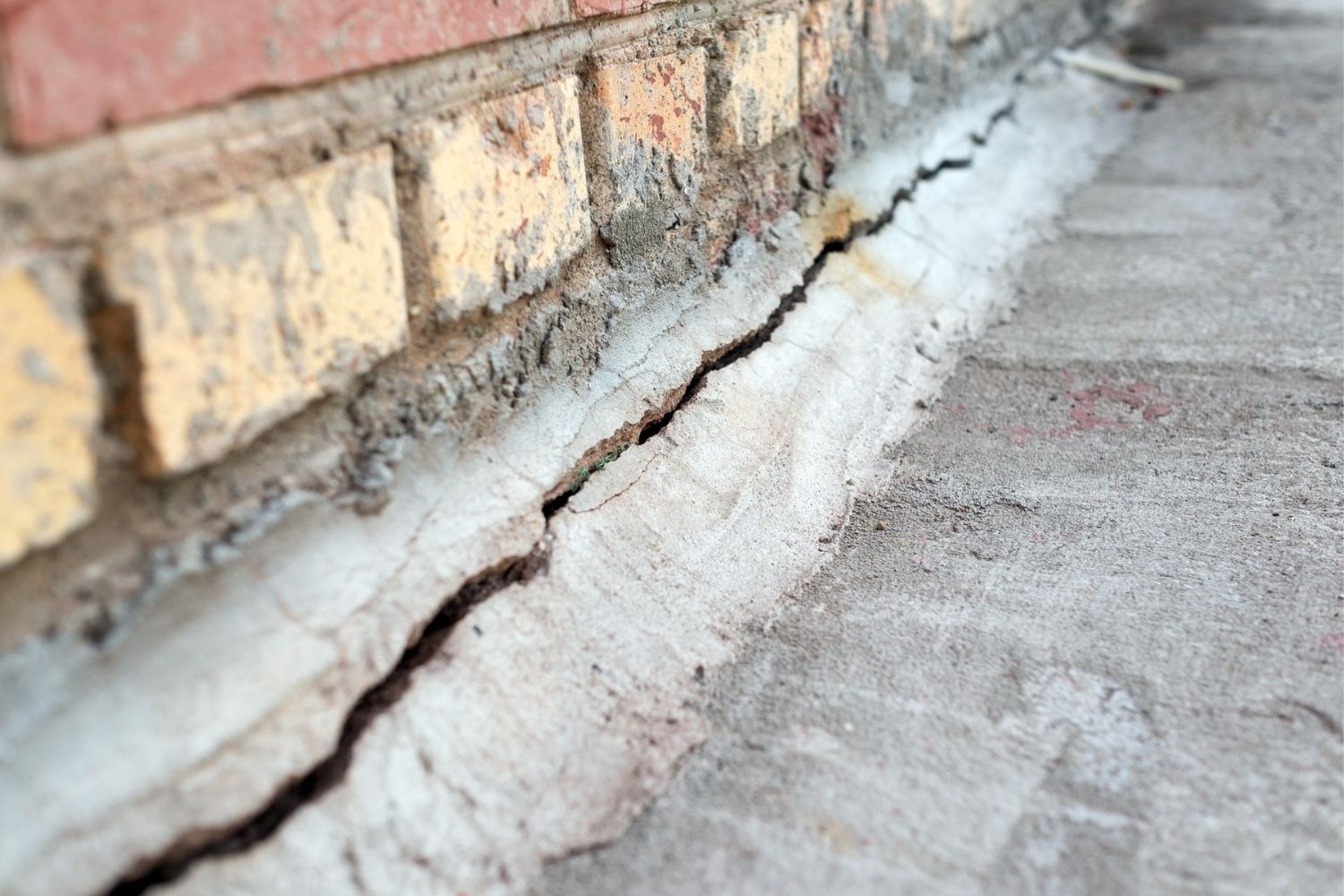
Mudjacking or Slabjacking
In cases where the foundation needs to be leveled, a foundation repair professional may recommend mudjacking or slabjacking, which costs $500 to $1,300. This process includes pumping foam or cement under a part of the foundation to raise it to the same level as the rest of the slab. Depending on the type of slab foundation repair that is needed, jacking isn’t always an option, but when it is, it’s one of the most affordable solutions.
Piering or Underpinning
While it can be relatively costly, piering is a long-lasting solution that involves installing underground piers under the foundation to prevent sinking and shifting. Underpinning can cost between $1,000 and $3,000 per pier, which can add up depending on how many piers are needed. However, the cost is often worth it as homeowners won’t have to worry about having the repair done again anytime soon.
Stabilization or Reinforcement
Poor soil quality can cause the walls of a basement or foundation to bow. In addition to fixing the soil, the solution to this problem is to stabilize using reinforcement strips, which may be made of steel or carbon fiber. These strips are sold by the dozen and cost around $4,000 and $12,000, with steel being at the pricier end of this spectrum than carbon fiber.
Do I need foundation repair?
Homeowners who notice cracks in the foundation or interior walls, crumbling bricks, or doors that do not open and close smoothly will want to contact a professional to assess the damage. A foundation repair professional will know what to look for and how to determine whether these are signs of a more significant problem.

Stop Foundation Damage Before It Gets Worse
Groundworks expert team can fix foundation issues before they become costly. Schedule Free Inspection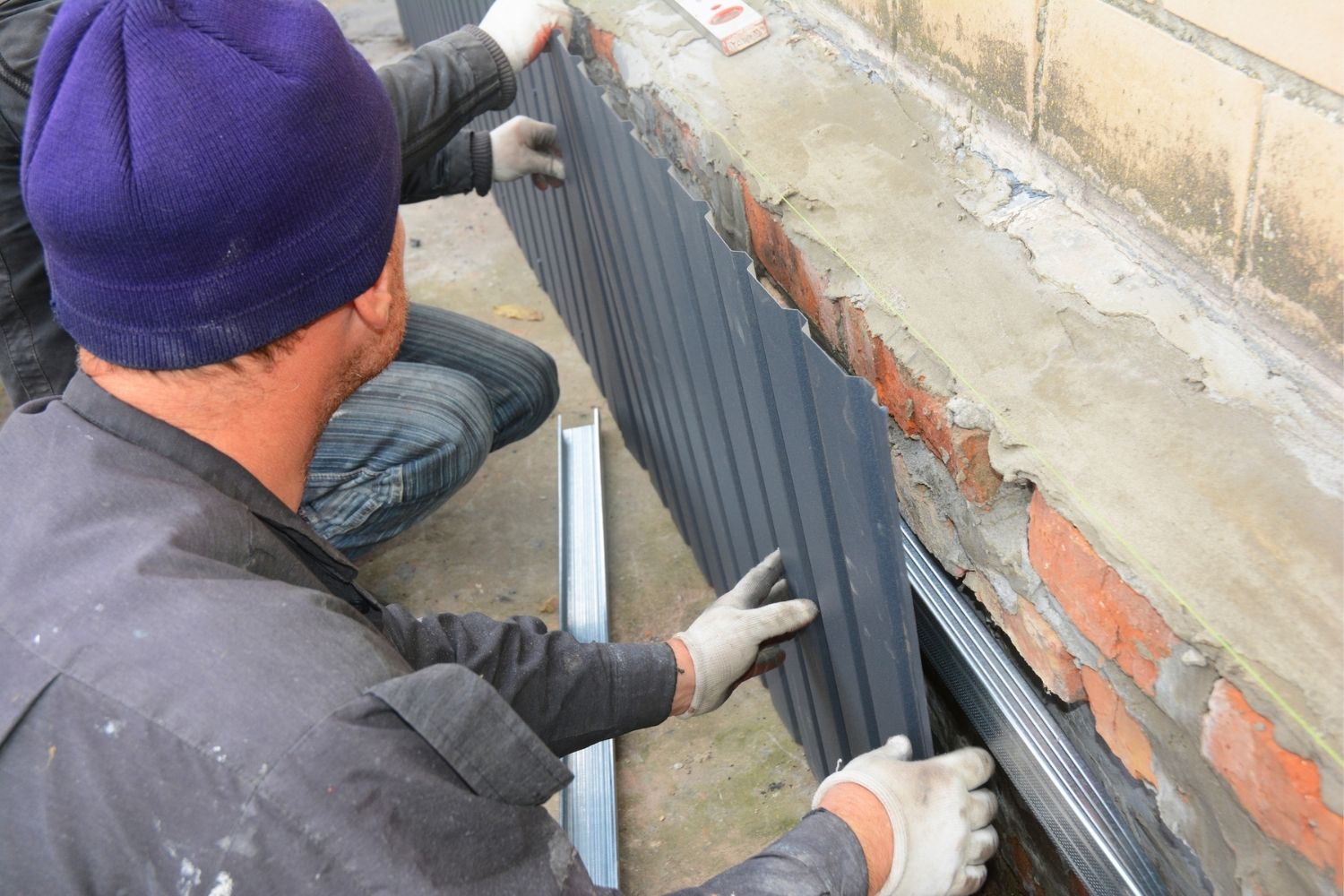
Basement Leaks
Because they are underground, basements have a higher range of potential problems, and foundations beneath basements tend to be costlier to repair. If there is excessive dampness or leaking in a basement, the foundation is a likely culprit. Water damage works quickly and can lead to other unpleasant issues like mold, so it’s advisable to act as soon as the signs appear. The cost for leaky basement foundation repair is between $2,000 and $7,000. For those who are in the process of finishing their basement, it’s essential to budget for leak repair and waterproofing as part of the basement remodel cost.
Horizontal Cracks
While some small cracks are to be expected in any foundation, horizontal cracks in a brick foundation can be a red flag. Horizontal cracks indicate that there is a buildup of pressure on the perimeter of the home, whereas vertical cracks do not. Tiny cracks—⅛ inch or smaller—are probably not indications of damage. However, a serious horizontal crack of at least 15 millimeters in length or with a ¼-inch gap can be a sign of significant foundation movement and should be addressed right away. Water damage and burrowing insects can make the damage worse.
Crumbling Concrete
Crumbling can be a result of water damage, old age, or something much more serious, such as sinking. In any case, crumbling concrete can compromise the integrity of the home if not fixed. One solution for crumbling concrete foundation repair may be to fill gaps with epoxy or polyurethane. Otherwise, it may be necessary to address drainage or soil problems in addition to structural repairs.
Damp Crawl Space
A home with a pier and beam foundation may be subject to water damage in the crawl space if there is insufficient drainage. A damp crawl space can cause a whole host of problems, such as mold, termites, a musty smell, and a deteriorating foundation. It may be necessary to implement drainage systems around the crawl space to keep the area dry.
Poor Drainage or Pooling Water
If sewer or drainage pipes have sprung a leak, the excess moisture can cause the soil beneath a foundation to shift or prevent proper drainage. If there is water pooling in the basement or yard, the homeowner can call a plumber to find the source of the leak before having the foundation itself repaired.
Hard-to-Open Windows or Doors
In some cases, a shifting foundation can cause other parts of the home to become off-kilter. For example, floors or ceilings may become uneven and sag. Some signs that this has occurred are doors that are difficult to open because there is not enough room at the top or bottom of the frame. The same can happen with windows. Homeowners will want to keep in mind that another explanation for this phenomenon is humidity—wood can become bloated after a series of damp days. But if the problem does not resolve when the weather dries out, it’s likely a sign that the foundation is failing.
Gaping Around Windows or Doors
Another sign that a foundation is failing is gaping around windows and doors. When the foundation is uneven, walls can shift, causing windows and door frames to become visibly misaligned. Doors may not stay latched, and double doors may not line up evenly.
Sloping or Sagging Floors or Walls
If it seems like the floors are sloping or uneven, the foundation has likely shifted significantly. Floors may also begin to squeak more than they used to. If uneven floors become severe enough, they can be a safety hazard, especially for those who already have difficulty walking. It is important to address this problem as soon as possible to avoid personal injury or further damage to the home.
DIY vs. Hiring a Professional
When it comes to foundation repair, DIY-ing should be limited to filling minor cracks. Still, those small cracks could be a symptom of a much larger problem that only a professional can identify. The best way to determine whether a crack is a sign of a serious structural issue is to consult a structural engineer or a foundation repair contractor. If the problem runs deeper, the cost of future repairs will increase exponentially as problems fester underground. Even if the cracks are only cosmetic, the peace of mind that comes from a pro giving the foundation a clean bill of health is priceless.
Many times, foundation damage can lead to additional problems throughout the home. A settling foundation can put pressure on plumbing, cause structural damage to walls and floors, and create gaps that leave the house vulnerable to pests. Usually, the problems will continue to worsen until a professional is brought in to tackle the shifting or sinking foundation. By hiring a foundation repair professional, homeowners can potentially avoid the expense of foundation replacement and all the accompanying repairs down the road.

Stop Foundation Damage Before It Gets Worse
Groundworks expert team can fix foundation issues before they become costly. Schedule Free Inspection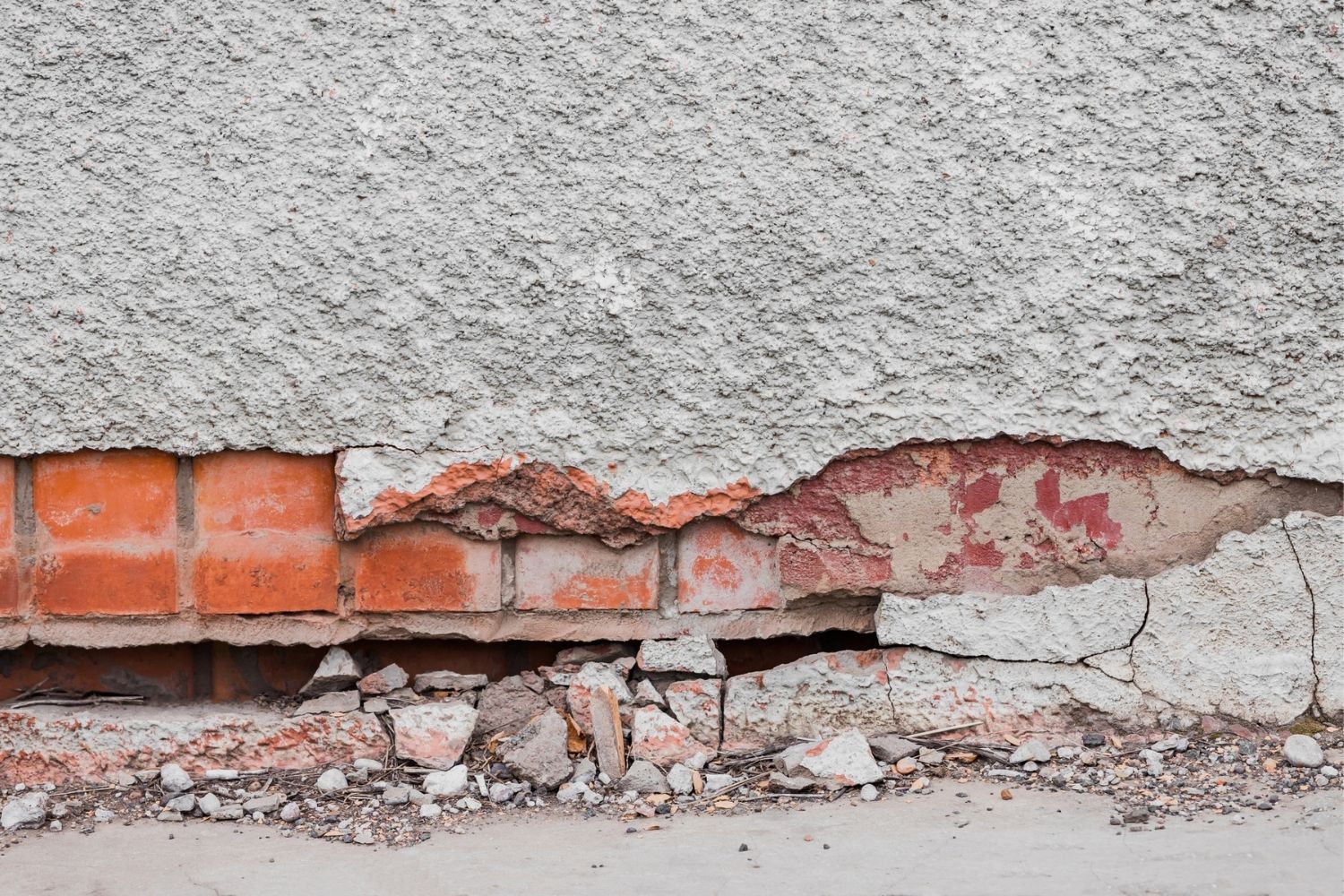
Financing Options and Money-Saving Tips
Foundation repair costs can be high, and the additional costs associated with the project can quickly add up. One way to save on foundation repair is to buy the cheapest materials for the project, but there are other ways to save without compromising quality.
- Get multiple quotes. Request an estimate and cost breakdown from at least three reputable foundation repair professionals in the area. Keep in mind that some foundation contractors may be more familiar with the foundation’s unique problems than others.
- Request cost-effective options. Ask the foundation contractor or engineer if there are any temporary, cost-effective options. This is beneficial for homeowners on a budget and can help buy some time to save up for the project.
- Do preventive maintenance. If the current damage to the foundation isn’t severe, some preventative maintenance can be DIY-ed. Make sure the gutter and drainage system work properly to drain water away from the foundation, mark foundation cracks and monitor them every few months, and call an engineer if any significant signs of foundation damage appear.
- Prioritize repairs. Ask the foundation contractor if they can tackle the most critical repairs first. This will make it possible to save and budget for the more minor repairs down the road.
- Waterproof the foundation. If the foundation is currently in decent shape, waterproofing the foundation as soon as possible will help preserve it. This up-front cost could end up saving money on costly foundation repairs in the future.
- Search for free inspections and estimates. Some contractors in the area may offer free foundation inspections and estimates. Gathering and comparing the information helps homeowners budget and negotiate to get the best prices.
- Ask about a payment plan. Some foundation contractors may offer a payment plan so homeowners can pay over time instead of one large lump sum.
- Don’t wait. Don’t delay if the foundation is clearly in need of repair. The longer the problem persists, the more extensive the damage and cost can become.
A damaged foundation can be expensive to repair, but ignoring the problem will make it worse. Homeowners who don’t have the funds to pay for foundation repairs can consider the following financing options.
- Foundation repair company financing. Homeowners will want to check with their foundation repair contractor to see if they offer any sort of financing to help customers afford repairs.
- Personal loan. Homeowners can use one of the best personal loans to pay for a wide array of home improvement projects, including foundation repair. A good starting point is for homeowners to check with their current bank to see if they can get a personal loan.
- Federal grants. If a homeowner is unable to qualify for a loan or financing, they can look into federal grants through the U.S. Department of Housing and Urban Development (HUD) and the U.S. Department of Agriculture (USDA).
- Home equity loan. Homeowners who have been in their home for a while will likely have enough equity to qualify for a loan from one of the best home equity loan lenders (like U.S. Bank or Flagstar Bank). This type of loan uses the equity the borrower has in their home and provides a lump sum of cash to pay for expenses such as home repair. The homeowner then repays the loan monthly alongside their regular mortgage payment.
Questions to Ask a Pro
Asking a professional the right questions about foundation repair costs can help homeowners minimize miscommunication, save money, and achieve the desired results. Below are some questions for homeowners to ask the best foundation repair companies to determine which will be the best fit.
- Is your company insured?
- Do you carry workers’ comp insurance?
- How long has your company been in business?
- Who will be doing the foundation repair?
- How long will the project take to complete?
- What type of soil do I have, and how does that impact the issues and repairs?
- Will the crew clean up after the project is completed?
- What will happen to my landscaping?
- Is there a potential for damage to irrigation lines?
- What type of repair method do you recommend, and why is that the best for my house?
- Do you offer a plumbing test to ensure there’s been no damage to the plumbing during the project?
- Do you offer a warranty?
- Will your company get all the required permits for the job?
FAQs
Deciding on foundation repair while staying within a budget can be a daunting process for homeowners. Listed below are some frequently asked questions about foundation repair costs to help guide the decision-making process.
Homeowners can expect to pay $4,926 on average for house foundation repair. Some superficial cracks can cost as little as $500 to repair, and hydraulic piers can cost $10,000 or more. Many homeowners pay between $2,156 and $7,752 to repair foundation issues. It’s worth referring to a foundation repair cost calculator for the most accurate estimate.
Most insurance companies consider foundation repair a regular part of home maintenance, so they rarely cover the cost. However, homeowners insurance may cover foundation issues if they are caused by a covered peril such as a fire, storm, or vandalism.
Common signs of a bad foundation include:
Cracks in the foundation walls
Crumbling or cracking bricks or concrete
Insufficient water drainage on the outside
Water seeping through basement floors or walls
Doors and windows that are difficult to open and close
Cracks in the interior walls
Sloped and warped floors
Bowed or bulging walls
Door and window frame separation from brick
When selling a home, owners are required to disclose any foundation repair work that has been completed on the home. Foundation problems can affect the entire home, so discovering that a foundation is in disrepair can be a huge turnoff for potential buyers. While some sellers are wary of disclosing that the foundation has undergone any foundation repairs, this information may make the home more attractive, since buyers won’t have to be responsible for those same repairs down the road.
Sources: Angi, Fixr, HomeGuide, Concrete Network

